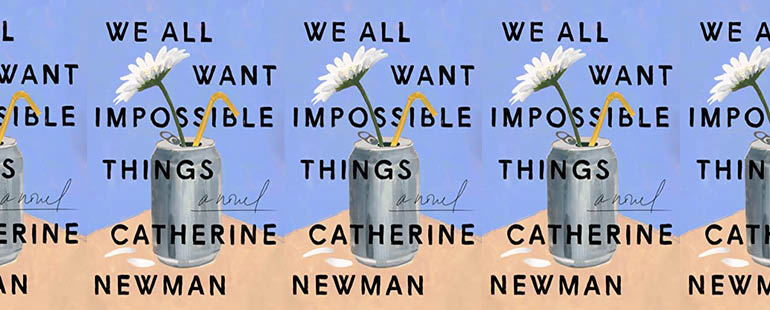Grief and Love in We All Want Impossible Things

My grandma died the day after Christmas in 2008, in a rented bed nestled into the corner of her double-wide trailer’s living room, surrounded by her daughters and husband and grandchildren. She was only seventy-one. She’d chain smoked her whole adulthood, her fingers stained with nicotine, her red lipstick rimming the butts in her castle-turret ashtray like it rimmed the edges of her Pyrex cups full of instant coffee “just kissed” with cream. But her lungs were fine—the diagnosis was non-Hodgkin’s lymphoma, and she faced it bravely. I would take the train from Chicago, IL, where I was in graduate school, back to the Ann Arbor, MI, station and visit her at home or in the hospital before she passed, fiercely committed to our mutual adoration club. I remember in particular the night I spent in her hospital room listening to her enthuse about the beauty behind a wall that she’d seen open in the distance, sliding aside to reveal a riotous garden. She wasn’t afraid in this delusion, just in awe. I remember watching the daytime crimson drip of chemotherapy, too, but the chemotherapy didn’t do everything it needed to do, and she faded in the midwestern winter. My husband and I drove home for Christmas and stopped on the way to my grandparents’ house to surprise them with Burger King Whoppers—Grandma inexplicably loved them refrigerated and then microwaved, with extra onions—but her wide smile at seeing us didn’t hide the fact that she wouldn’t be eating any more reheated Whoppers.
I’d had a cold and wore a mask in the house, wrote something cheerful on the outside—was it I love you? A joke?—and she told me to take it off, that it didn’t matter anymore. She let me sit next to the bed, hamburgers abandoned, and feed her butterscotch pudding. She managed just a few small bites like a fuzzy-headed little bird and smiled at me beatifically between them. “Have you ever had something so perfectly sweet and salty at the same time?” she asked me slowly, her eyes deep pools of love.
I hadn’t been this close to death before. I was twenty-five. I’d known loss—her mother, my great-grandma, beloved for her generous Polish-German cooking and crush on Walker, Texas Ranger, had died ten years before, and before that my great grandpa. In early childhood, I’d lost a teenaged cousin to a tragic heart condition, and her mother, my aunt, had gone missing the week of my seventh birthday, leading to an unsolved mystery that haunts and shapes my family to this day. But I’d not been in the room with death, and certainly not with it in the front room of my grandparent’s little home, the room where I’d spent dozens of evenings for sleepovers with microwave popcorn and Crystal Lite (Grandma and Grandpa’s spiked with gin, I learned years later). No one had loved me quite like my grandma, either, with her bottomless well of unconditional admiration. I hadn’t been this close to death, but I also hadn’t been this close to the loss of that kind of care.
The day she died was their anniversary: fifty-one years from a morning mass the day after Christmas. Grandpa had asked her to wait until then, and she did. Her breathing was noisy, her consciousness somewhere far away from us. We touched her body and told her she was free, that we loved her, that she’d loved us so fiercely, that she could let go. I kept my hands on her feet at the end of the bed, and I breathed in time with her, holding my breath for each long pause between the rattling inhalations until finally I had to breathe again—and she did not. She was gone.
Here’s the thing about death: it happens in the middle of life. It happens in the world. In Grandma’s case, it happened in an ice storm, and so the hospice nurse and the undertakers couldn’t get to us for hours. We sat around the body that had been Grandma—fewer than five feet tall all her life, but so vibrant with sequins and leopard print and deep grudges and soaring affections—and we mourned. And then we found ourselves hungry, and so we scrounged in Grandma’s upright deep freeze and baked frozen pizzas in her oven and ate slices on Grandma’s plates in the small trailer, next to her quiet flesh. She wouldn’t have wanted it any other way, we knew. When the hospice nurse arrived in the ice, she showed us how to wash her body with a few drops of the Bath and Body Works shower gel in the musky warm amber scent she liked, from the new bottle I’d carefully wrapped because I’d drawn her name in the family gift exchange and it had been the main thing on her list. Later we returned the bottle to the store—we’d used so little of it, and no one in the family could bear the scent or the thought of the cost going to waste. Grandma would have approved of this thrift too.
I was taken back to that mobile home, that December ice storm, that kindly end to a firecracker life, when I read Catherine Newman’s new novel We All Want Impossible Things, a compulsively readable and tenderly hilarious first-person narrative of a woman’s experiences in the last weeks of her best friend’s life. This is Newman’s first novel for adults, but she is a prolific writer: of books about parenting (Catastrophic Happiness and Waiting for Birdy), books for kids (including the recent What Can I Say? and How to Be a Person, which offer illustrated guides to human skills), dozens of newspaper and magazine stories, and a blog called Ben & Birdy, established in 2005, beloved in the golden age of so-called mommy blogging and active to this day. I’ve followed Newman’s work for nearly that long—her blog was among the collection of craft, food, and daily life online journals by women that I read devotedly in the early aughts, narratives that grounded me as I undertook a doctoral program heady with literary theory. Looking back at the entries from 2008, the year of my grandma’s cancer, I see low-resolution photographs of Newman’s children, probably around the ages my own children are today. I read a post and realize that she’s probably where I picked up the habit of beginning emails and social media updates by calling my readers “dear ones.” I see a jumble of recipes and jokes and unapologetic kindness, and I see again that Newman has often modeled for me the kind of grown up I want to be when I grow up.
This is no less true now than it was fourteen years ago, and We All Want Impossible Things is one more reminder of Newman’s characteristic blend of self-deprecation and openheartedness. The premise is simple: the narrator Ashley’s best friend Edi is dying of ovarian cancer. Treatments have failed, and she’s being released from hospital to hospice care, but the New York City hospices are full, leading to the difficult choice to take Edi to a hospice in the Massachusetts town where Ash lives. The added heartbreak of it is that this means Edi must say goodbye to her young son Dash before leaving, so he can stay home with her husband and maintain some semblance of stability. This leaves Ash in the role of primary presence to her friend in the last weeks of her life, a role she takes on eagerly.
The plot of the book is also straightforward: there is no question Edi will die at some point, although the question of when persists throughout most of it, in the way this question persists in any hospice experience. One never knows quite when the Whoppers will lose their charm. The novel’s focus is less on Edi’s experience than on Ash’s: it bears witness to the mysterious and deeply private experience of dying, yes, but much more so to the experience of the ones left behind. It’s a book about grieving in the weeks leading up to death, about maintaining presence to a friend, about keeping one’s heart open to the love that will make the loss hurt so much worse, about falling apart. Ash copes imperfectly: her teenage daughter keeps skipping school and stumbling upon her mother in bed with different people; Ash waxes metaphysical at inopportune times; she guiltily smokes in secret and pines after her quite wonderful but problematically cheerful estranged husband; she grapples incessantly with insecurity and even jealousy.
But the love between these characters is palpable. For all its depictions of blundering around in the fog of grief—there’s a funny quip at the end about how to write a good thank-you note to hospice workers: “Don’t have slept with everybody”—We All Want Impossible Things is a paean to kindness, to the kind of friendship and family relationships that unabashedly avow their love and affection, that cuddle and enthuse and share delicious food and drink and lean hard into humor. Everything is earnest but somehow not sentimental: it’s sweary-tender, which is to say, it’s vintage Newman, even apart from the many autobiographically resonant details that suggest Ashley isn’t in the end so far off from Catherine.
The book doesn’t pretend or indeed attempt to resolve grief but watches it with warm eyes, invites its readers into grief’s impossibilities without false comfort but with unremitting gentleness. Other people in the hospice die, some of them very old but no less dear to Ash who has cut their hair and painted their nails and been present to their abiding humanity. A baby dies. There is no way to make this okay, and the novel doesn’t try but rather gives voice through its characters to the deep too-muchness of such sorrow. It names what is true: that loss is an impossible devastation. That love is an impossible gift.
I read this book in a two-day stretch spent mostly in bed, recovering from a pneumococcal vaccine—one of those shots they give to babies now but didn’t when I was a baby, and also give to the elderly and immunocompromised. I’m in that last group, half a year into immunosuppressing medication for chronic disease. I’d been anticipating the novel for months—I’ll read anything Newman writes—but feared it would hit too close to home. My own body’s vicissitudes confront me, more than anything else, with a fear I will not be present for my children’s childhoods, and two years ago I faced a cancer scare of my own. Just this summer, some of my dearest women friends walked with another of our friends through her life’s last days. She lived long enough to see her son graduate from kindergarten. Another friend two years ago left behind a school-aged daughter. These women were vibrant, young, so full of gifts to offer the world, so full of imperfect goodness and hilarity and longing. I wasn’t sure I could read another book about another woman besieged by cancer, another unspeakable loss, especially not as my body fevered and ached and asserted its own permeable impermanence.
But the novel buoyed me up instead. I wept and laughed and wept again through it and then found my fever broken and so got up and made my family dinner, the way one does: the way Ashley’s erstwhile husband cooks all the mourners French toast, the way we feasted on slices of frozen pizza in my grandma’s living room beside her occupied but empty hospice bed. I purposed, again, to live more unabashedly, to enthuse to my heart’s content over what is delicious and beautiful and hilarious in the world, most especially the expansive network of people I love, and to worry with Ash a bit less whether they love me back as much as I love them.
Sometimes books do this: they show us how we can be together. We All Want Impossible Things is How to Be a Person in another guise, How to Be a Person for grownups who have learned or are learning or will learn that the price of love is excruciating loss, but we wouldn’t have it any other way. In this novel, Newman continues to do what she does best, which is to write an earthy humanism back into the contemporary consciousness—funny but never cynical, wholesome but never pious or judgmental, unapologetically devoted to affection and the possibility of personal growth. She offers us a vision of the world in which a hospice room is a place of feasting as well as those haunting last breaths: where a child is unconsolably bereft of his mother’s presence and at the same time surrounded with the fierce love of everyone who loved her, a community of people who will continue to love him with a love as bottomless as their grief.



